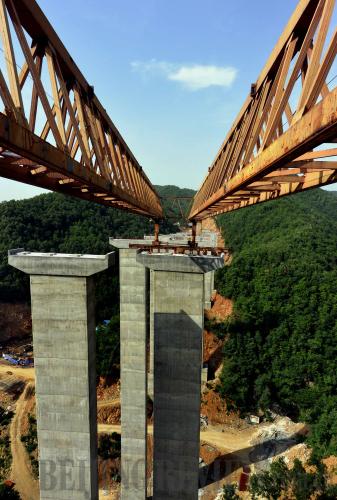|
 |
|
SCHEDULE ON TRACK: A massive bridge, erected in Funiu Mountain, Henan Province, is under construction. When completed, it will make up part of a key expressway project, traversing mountainous areas in the province (WANG SONG) |
Reform Priorities
The National Development and Reform Commission (NDRC) on May 20 released economic priorities for 2014 in a plan that has been approved by the State Council, the country's cabinet.
The NDRC said authorities will cut red tape and slash items that need administrative approval.
China will continue to expand the scope of value-added tax (VAT) reform and move to regulate financing of local governments.
A new mechanism of the yuan exchange rate will be developed and the volatility of the rate increased. Capital account convertibility will expand in an orderly manner.
Eligible private investors will be allowed to start financial institutions like small or medium banks and invest in established ones.
As prices are stable, China will reform prices of resource products and in sectors including transportation, telecommunications, pharmaceuticals and healthcare.
State-owned enterprises will move toward mixed ownership through a cooperation mechanism between state and social capital.
Solar Industry Enraged
China's photovoltaic (PV) industry issued a statement on May 21, opposing the second U.S. anti-dumping and countervailing duty investigations on Chinese PV products.
Representatives from the China Chamber of Commerce for Import and Export of Machinery and Electronic Products, China Renewable Energy Industry Association, China PV Industry Alliance and major manufacturers including Yingli Solar and Trina Solar, pushed down a symbolic "wall of trade barriers" at a press conference in Shanghai on May 21.
The joint statement called for the United States and China to solve the disputes through negotiations.
Chinese PV products are well received the world over for their low cost and efficiency, high quality and comprehensive after-sales services, and the industry has no need whatsoever to engage in activities involving dumping and illegal subsidies, according to the statement.
Trade protectionism seriously hinders industrial development and will affect the development of the U.S. real economy as well as its employment levels, it said.
On February 14, the U.S. International Trade Commission (USITC) determined an affirmative indication regarding injury to the U.S. industry as part of the new anti-dumping and countervailing duty petitions against PV products from the Chinese mainland and Taiwan.
It was the second U.S. investigation against Chinese PV products, counting a similar probe in 2011, and it has seriously affected the Chinese PV industry and hindered the development of the U.S. PV application market.
The U.S. Department of Commerce is expected to release the preliminary countervailing duty investigation results on June 2 and the preliminary anti-dumping investigation results on July 28, before releasing the final results on December 11. The USITC will determine whether or not to levy taxes on January 26, 2015.
Partnering With Russia
A joint investment vehicle set up by Chinese and Russian sovereign wealth funds announced three deals on May 20 in Shanghai that see it diversify into the service sectors of the two countries.
Nearly seven months after its $200-million deal to acquire a 42-percent stake in Russia's second largest forestry company, the Russian-China Investment Fund (RCIF) is eyeing opportunities to expand its investment into sectors such as logistics, healthcare and tourism, according to Kirill Dmitriev, co-CEO of RCIF.
In addition, it will pursue projects in agriculture, energy and natural resources.
Under the new deal, RCIF will partner with a Russian development fund to commit $400 million in both equity and debt for the construction of a cross-border railway bridge, the first to span across China's border with Russia over Heilongjiang River, also known as Amur River in Russia.
The fund also joined Hopu Investment Management Co., a private equity firm in China, in a deal to invest an undisclosed amount into Global Logistics Property, which operates logistic infrastructures in China, Japan and Brazil.
Dmitriev said the motive behind the deal is to acquire expertise in logistics management, which will be useful when Russia develops its own logistics projects in the future.
| 